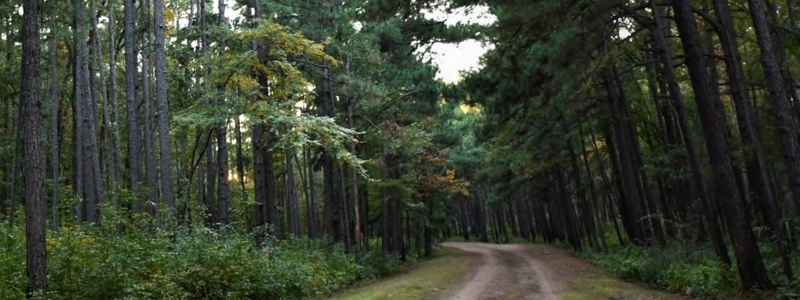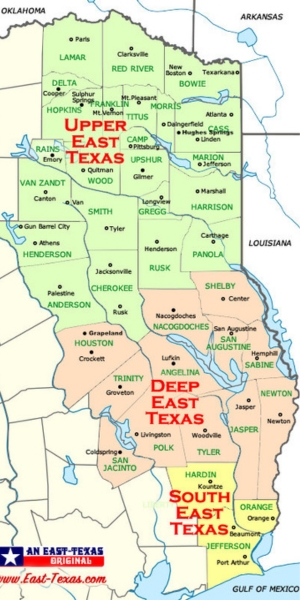The World of East Texas Hot Links

Eugene Lee’s East Texas Hot Links is a Pulitzer Prize-nominated play that examines the intricacies of Black rural life during the Jim Crow era—a time when racial segregation was the law of the land. The play is set in the summer of 1955 in the piney woods of East Texas—a region known for its thick forests. The action takes place in the Top o’ the Hill Café, which serves as a sanctuary for Black men. This café creates space for community members to gather, converse, laugh, and find comfort while navigating daily trials and personal strife. Within these walls, Lee’s richly drawn characters reveal their complexities as the audience gains insight into the sociopolitical and racial contexts that shape their lives.

The setting of this play is not merely a backdrop but an integral part of the storytelling. Because this play is about place as much as it is about race, it is essential that we consider the location in relationship to the action. East Texas has a long history of racial violence. Between the late 19th century and 1950, Texas witnessed nearly 500 lynchings. Approximately 75% of lynchings were carried out with assistance from law enforcement. Most of these lynchings and similar acts of terror took place in East Texas. An example is the Slocum Massacre. In 1910, Slocum, a town in East Texas, was filled with Black residents who owned businesses and farms. On July 29, 1910, mobs of heavily armed white supremacists went from house to house killing Black residents because of a rumored uprising. Homes and businesses were torched, children were killed, and the community was destroyed. Evidence suggests that as many as 100 Black residents were murdered. To fully comprehend the world within which the East Texas Hot Links characters live, we must acknowledge the pervasive racial violence that has historically defined this region.
The time wherein the play is set further contextualizes its exploration of racism, degeneration, and disenfranchisement. In 1954, the Supreme Court’s landmark Brown v. Board of Education decision declared segregation in education unconstitutional. That same year, the Armed Services announced the integration of all its branches. However, in 1955, East Texas remained segregated. In 1955, East Texas saw the continued enforcement of Jim Crow laws. In 1955, the world learned of the horrific violence that many Black Southerners experienced through the reporting of the brutal murder of Emmett Till. While Till’s death mobilized Black communities across the nation, the road to equality in East Texas was met with fierce and often violent resistance. Eugene Lee’s East Texas Hot Links captures the tension of this historical moment.
While East Texas Hot Links troubles America’s past, it also reminds us that the past is ever-present. During a post-show discussion of a 1998 production of East Texas Hot Links, a patron remarked that this story no longer has relevance. A week later, James Byrd Jr. was dragged to his death by three white men in Jasper, Texas, which is in the Deep East Texas region. Byrd’s death shocked the nation as echoes of the terror felt during Jim Crow could be heard. Like the unseen characters in this play, the perpetrators of this crime were affiliated with the Ku Klux Klan and other white nationalist organizations. This event, which occurred more than four decades after the setting of East Texas Hot Links, underscores the enduring nature of racial hatred and the continuous struggle for justice.
East Texas Hot Links is not solely a story of racial terror. It’s also a play about a community of complicated people whose joy, resilience, and humanity shine through their lively banter. They dance. They joke. They foster meaningful relationships. As Columbus declares, “it’s nice to have a Top o’ the Hill to come to…to get above all the s**t in your life.” Eugene Lee’s evocative storytelling, witty dialogue, and nuanced characterizations allow us to confront uncomfortable truths about America’s past and present. Under Parson’s direction, this production honors the legacy of those who have fought for justice and serves as a call to action for future generations.
2 responses on “The World of East Texas Hot Links”
Comments are closed.
I and the three people I was with all loved the play. Right now we are trying to find out where to find a copy, Neither Abe Books, Amazon.com, nor the Seminary Coop on 57th St, has a copy, Please advise. Thank you very much.
Hi Mary Beth! That’s wonderful news and we’re thrilled to hear that you and your guests enjoyed the production. If you’d like to purchase the script, you may do so via Concord Theatricals (https://www.concordtheatricals.com/s/4632/east-texas-hot-links). If you don’t want to buy the play but would still like to read it, Chicago Public Library has a copy (https://chipublib.bibliocommons.com/v2/search?query=east%20texas%20hot&searchType=smart). Enjoy!